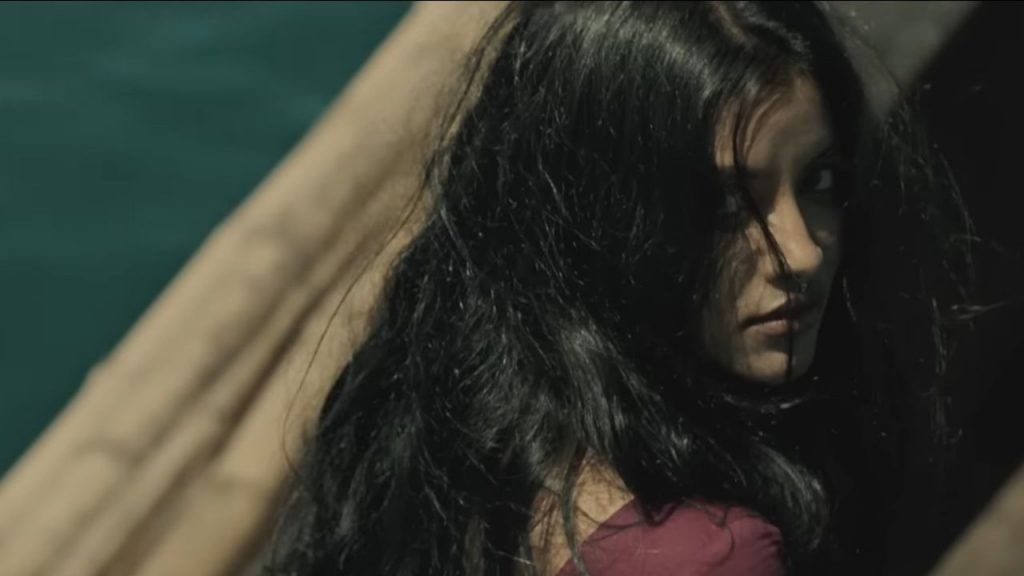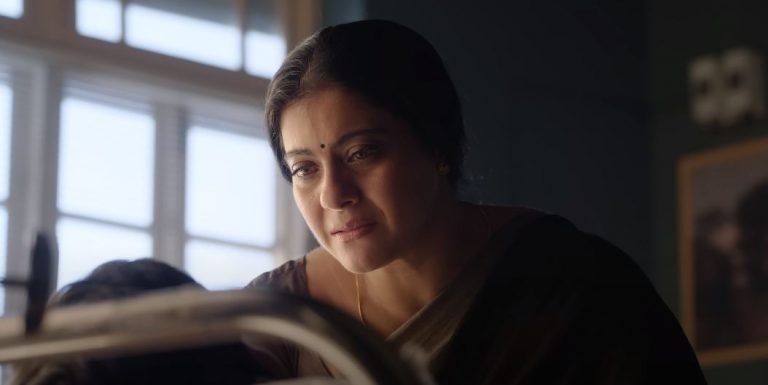Early on in Hawa (2022), as the dockyard rings with activity, boats setting sail, returning, and fishnets being emptied, someone talks about the decay of faith, the consequent loss of purity that discolors everything else. He adds,” at sea, there’s no science.” The sea frames the film’s action; it holds silent vigil over all while wreaking its mysteries, slowly and wilfully unmooring itself from the civilizing impulse. Decency and moral codes check out, and ill will festers large. As director Mejbaur Rahman Sumon conducts and relates, these mysteries spill with a lethal deliverance of justice and circumstantial re-ordering. Those who drift away on the sea find their way back. How they returned, they don’t have an explanation. Maybe dolphins guided them, someone teases.
Sumon peers into the interface between faith fading and latching firmly onto its remnants, the vanishing of blossoming kindness at the behest of the most vicious, collective masculinity, invoking convenient self-serving myths.
The fishermen in Hawa (2022) are led by Chan Majhi (Chanchal Chowdhury) in the piracy trade, siphoning off their catch from the sea into other profiteering networks beyond their boat’s beholden Mohajan. However, there’s one who refuses to play by Chan’s diktats. Iba (Sariful Razz) is uneasy about and reluctant to engage in this risky piracy of fish sale, the distribution of which he sees as grossly unequal. For the boatmen who Chan inspires authoritatively, Iba becomes something that must be weeded out for everyone’s profit-making to keep the cogs of this secret wheel running. While the rest are vocal in their aversion to Iba’s non-compliance, Chan is sly and quiet in his agenda-making. Echoing a line earlier in the film, he is the poison that spreads quickly, sullying everything in its wake. He keeps his vituperative edges sheathed carefully, but the violence unleashed implicitly is nonetheless a freely ranging beast of its own.
Sumon lays quickly noxious slats of distrust bred by an irremediably tarnished soul that gradually catches up with each of his characters. Sumon is obviously interested in the influence of evil, the shadows it casts, and greed as vast as the sea itself. These themes are threaded into a cross-pollination of revenge, star-crossed romance, myth, folklore, and fantasy.
In his catapulting avarice, Chan clears the path that trails to his doom.
One stormy night, under cover of heavy rain, the boatmen net something unusual. What surfaces is a woman (Nazifa Tushi) who appears to another initially as a giant Surma fish, whether due to alcohol-induced stupor or in bright clarity, one knows not? They fear she’s dead, anxiously whispering,” a dead woman on a boat isn’t a good sign.” She refrains from speech and expectedly assumes the cynosure of the men. Her presence wields a captivating immediacy that draws in while being unflinchingly self-assertive. She’s the archetypal mystery woman perfectly primed to propel the narrative with suspicions and apprehensions about her covert designs and motivations.
The woman positioned in the narrative as the anomaly who threatens the eventual breakdown both slips out of grasp and is chained. It is she who foils the well-laid plans of Chan to set Iba’s death trap.
Everyone is intent on establishing an intimate familiarity with her, impressing her, and making desperate overt advances on her. Once she’s amidst them, the haul gets poorer, and distress signs start creeping in. As a counterpoint to the erosion of conscience, she prepares the ground for setting off her intentions into swift action.
Much of Hawa engages with the woman’s incursion into the group of the boatmen, the sway she holds, the bodily impact she exerts, and the larger, ultimate cataclysmic effects. Sumon creates characters rich with palpable drama and intrigue, the central tussle between the wily Chan Majhi and the woman, but problems are aplenty as a lot of the scenes, the writing around them suffers from trite, tired storytelling conceits. Characters come off as either woefully underwritten, ladled with one long exposition to justify character motivations, or simply lazy afterthoughts to prop up elaborate plottings.
Faruque Amin and Sukorno Dhiman’s screenplay, working with Sumon’s story, struggle visibly to add adequate contextual heft to bare plot points. There are few and far between flashes of character insight and mostly many showy dialogues that attempt to explain a character’s calculations in broad strokes instead of illustrating with one deft grace note. That Chan Majhi is a manipulator is established early, but there are no breadcrumbs left for us to gauge the interiority of a person as him chalking out his many desires. His character development is stubbornly one track, a case in point for most characters, stripped of complex decisions.
Chowdhury lends Chan the requisite charismatic, commandeering menace, dictating whatever goes around on the boat, with a tone that sharpens further. But admittedly, it also gets exasperating when we see Chowdhury only snarling and barking orders, with infrequent moments where he gets to flash the conniving side or perform more subtle registers, such as a scene involving a betel leaf paan, a bird, and the woman. This particular scene stands out in its escalating, potent suggestiveness despite some unintentionally ridiculous shot-taking of Chan and his caged bird.
For much of the first half, the film operates in a slow-burn mode, letting the subterranean conflicts bristle and stew. Yet, the shifting dynamics engendered by the woman’s arrival teem with a bunch of uninspired, brisk, ineffective, and repetitive scenes that don’t exactly pile on the ratcheting tension. Sazal Alok’s editing often feels like it’s laboring to dial up and evoke what’s absent in writing.
The editing defuses any scope for dramatic potential, hopping in and out of scenes charting deception, swindling, and ambiguities of intention and motivation. The scenes limp ahead, dulled further by an absolute absence of character detailing. The tossing energies of a love story versus revenge’s pulls are especially inelegantly maneuvered. The love that grows in the tower is dealt with in a couple of unpersuasive business-like scenes. The screenplay zigzags wildly among scenes, the tedium nevertheless unmistakable. What aggravates this sore, rambling, bloatedness is the handling of the sexual politics, the woman’s mere presence spurs.
Sure, the woman is fundamentally an object that is perceived and dealt with in whatsoever manner the men deem fit in the situation according to the filmy logic. However, she comes off as trapped or rather affixed by a particular constricted gaze that only seeks to deny her dignity or have her pummel men to cheers and be handed one scene to buttress her existence. The film treads troubling, overfamiliar, and frankly repulsive territory, taking questionable choices and reducing her to a matter of extreme polarities.
Nazifa Tushi is compelling, playful, and has this beautifully untamed spark, but one wishes Sumon had dug deeper and fashioned her character with texture instead of thrusting onto her an alienated notion of how she should play herself. He endows her with these hyper aesthetic, painstakingly mounted shots with her shadow unfurling across billowing drapes illuminated by flaming lights, traipsing out to the boat’s stern, a speck in an endless backdrop at a majestic hour. Sumon treats her backstory revelation in a manner that cursorily lumps together all of her character’s withheld secrets. There’s a flat, listless quality to how it unfolds, despite the constant conspicuous frenzy of the camera to aid the scenes with a muscular unpredictability.
Undeniably, Hawa is significantly bolstered by Kamrul Hasan Khosru’s superb camerawork; the sea becomes, in his hands, the site of tragic mythic grandeur. His camera keenly follows the characters through the nooks and crannies of the boat, down into the engine room. But breath-taking shots occasionally lapse into indulgence, and the anchor jostled into the waters, coiled fishnets underwater.
There are a couple of local nicely realized ditties that the men sing while retrieving the fishnets, sound tricks that toy with the lightening impact of intoxicants, humor that works in bits and fits but soon borders on the grating as it feeds into the sexual panic, purely through a discomfiting male lens.
Hawa (2022) races through its third act with a rapidly ascending scale of dread and alarm, a spattering of ample blood that is simultaneously strangely reined in. The bloody orchestrations pulsate with authenticity and realism, its volatile energy hitting a crescendo, but it feels startling, disorientingly rushed. The frantic coda shoves at us a string of supposedly moving moments that are peculiarly devoid of any charge due to poorly developed characters. The sluggishness that preceded the coda almost offsets the emotional connection, provoking in us a distant marvel at its visual and aural experientiality. As the film winds up capitalizing on the opening note of suspensions of reality, one wonders if Sumon had been successful even in tackling the minutiae of the most primary, urgent human drama running parallel to the heightened otherworldly elements he has bunged in for a deliberate, loose, hazy effect.
Hawa screened at the 4th Bangladesh Film Festival in Kolkata (29 October-2 November 2022)
Also, Read:
Made In Bangladesh (2019) TIFF Review – A Colorful Empowering Film For Women Around The World
Hawa (2022) Official Trailer
Hawa (2022) Bangladeshi Movie Link: IMDb




![Death on the Nile [2022] Review: A Luhrmanesque Interpretation of the Source Material](https://79468c92.delivery.rocketcdn.me/wp-content/uploads/2022/04/Death-on-the-Nile-2022-768x434.webp)
![I Don’t Feel at Home in This World Anymore [2017]: Sundance Film Festival Review](https://79468c92.delivery.rocketcdn.me/wp-content/uploads/2017/01/I-dont-feel-at-home-in-this-world-anymore-1-768x489.jpg)

![Psycho [2020] Review – A Very Problematic and Insipid Take on the Serial-Killer Narrative](https://79468c92.delivery.rocketcdn.me/wp-content/uploads/2020/01/Psycho-768x576.jpg)
![The Hand of God [2021] Review – A Deeply Emotive coming-of-age tale about grief and love](https://79468c92.delivery.rocketcdn.me/wp-content/uploads/2021/12/The-Hand-of-God-3-768x433.jpg)
![The Fable [2019] Review: A genre-blurring film that is refreshingly unique](https://79468c92.delivery.rocketcdn.me/wp-content/uploads/2020/11/The-Fable-2019-1-highonfilms-768x494.jpg)